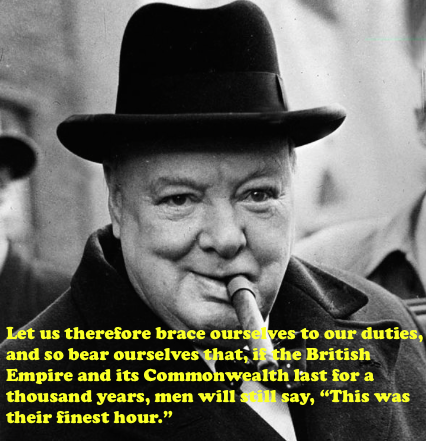
06 Jan Churchill and The Darkest Hour
I watched an interesting case study in leadership last night – though it would be easy to confuse it as being just another movie. Darkest Hour follows the exploits of newly minted Prime Minister Winston Churchill in the early days of WWII – and reminds again that the art of leadership, no matter how often it is dissected, reconstructed, and discussed, remains an elusive and ongoing study for all of us.
Churchill assumed the reigns of Prime Minister just as Great Britain was witnessing the collapse of allied European countries at the hands of Nazi Germany – following Neville Chamberlain at a time his country was literally teetering at the brink of ruin. While some British leaders rallied around the cause – an equal number argued that the island nation must capitulate before Hitler’s destructive forces reached their shores.
The story of Winston Churchill is well documented – he stands as one of the giants of the 20th century – a leader whose dogged determination literally galvanized a nation.
But watching the behind the scenes optic last night reminded me again how real leaders truly are different – and why, in times of crisis, they become indispensible.
Five inspirational points I walked away with last night.
- Great leaders accept their failures – and move on. Though only briefly touched on in the film, Churchill was forever scapegoated for the WWI failures at Gallipoli where his decisions as First Lord of the Admiralty resulted in a tragic loss of British lives. “Remember the Dardanelles” was the derisive outcry from opposition opponents whenever Churchill rose to speak in Parliament in later years – and more than tinged his controversial appointment to Prime Minister in 1940. And yet Churchill believed in those decisions and was to say later, “All my past life had been a preparation for this hour and for this trial.”
- Great leaders – at some point – embrace the humility required to create followership. Churchill, the irascible curmudgeon – short tempered, a heavy drinker and smoker – at a critical point in the movie embraces his own fears and insecurities…but uses that vulnerability to grow. We see a very unsure Churchill – stumbling to find his course as he contemplates a surrender pact – reach out to the “common man” in a powerful subway scene, reminding us again that truly transformative leaders aren’t perfect humans – but their capacity to fill the gaps by how they interact with others is critical.
- Great leaders understand the power of communication. Gifted with incredible oratorical skills when on the public platform, Churchill the man is given to incessant mumbling – outbursts of bombast – and is a bit of a walking caricature. But in times of perhaps greatest tension – Churchill the leader suddenly rises to heights that stun even the opposition. One political opponent lamenting …”he has used the power of communication to mobilize an army.” He did more than that – he mobilized a country.
- Great leaders recognize the importance of commitment. In another epic scene that followed his conversation with local citizens, Churchill gathers members of Parliament in a foyer to discuss the scope of the challenge ahead – and in a conversation that lasts no more than five minutes he allows the group to come to a conclusion he has already arrived at – for the first time not driving friends and foes to a decision to fight on – but instead guiding them there.
- Great leaders believe in the magic of purpose. By rights, England probably should have fallen to the juggernaut that was Nazi Germany – just like Poland, Belgium, France and so many other countries. By rights – the successful evacuation of hundreds of thousands of British troops from Dunkirk should have been unsuccessful. By rights – even a great country like Britain was more than susceptible to total destruction. But one leader – cast in a pivotal moment in history and in a role far larger than can be imagined today – stepped into the void, giving a face to the British public that transcended their fears. Selected by destiny for greatness.
The Darkest Hour should be a mandatory watch for every aspiring leader – and every current one should carry a notebook with them when they watch it for the fourth time. It literally is a textbook on transformative leadership – to include all the human imperfections that are a part.
I would add it to the following short list of “must watch” leadership movies – Lincoln, Apollo 13, The Bridge on the River Kwai, Saving Private Ryan, Braveheart, Sully, The Patriot, Invictus, Shackleton, We Were Soldiers, and Twelve O’Clock High just to name a few.
“We have before us an ordeal of the most grievous kind. We have before us many, many long months of struggle and of suffering. You ask, what is our policy? I will say: It is to wage war, by sea, land, and air, with all our might and with all the strength that God can give us; to wage war against a monstrous tyranny never surpassed in the dark, lamentable catalogue of human crime. That is our policy. You ask, what is our aim? I can answer in one word: It is victory, victory at all costs, victory in spite of all terror, victory, however long and hard the road may be.”
-Churchill – May 13th, 1940


Sorry, the comment form is closed at this time.